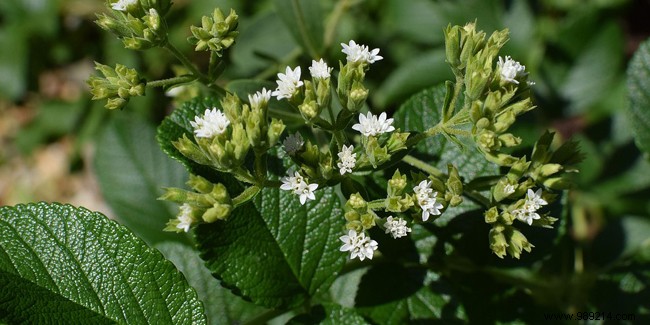
Stevia (Stevia rebaudiana ) is a plant from South America that has been used for a very long time by people in this part of the world as a natural sweetener. Its sweetening power is 200 to 300 times greater than that of sugar for zero caloric value.
The French Food Safety Agency (AFSSA) gave its favorable opinion in 2009 to be able to use stevia in France as an alternative food supplement to sugar. The European Food Safety Authority (EFSA) also issued a positive opinion in 2010. Is stevia a real alternative to sugar? What are its health benefits? Are there any dangers in consuming stevia?
Stevia is a plant of the Asteraceae family like tarragon, thistle, dandelion, gerbera, etc. It comes in the form of a small shrub. It is its leaves that are used in food to replace sugar, after being dried and reduced to powder. The sweetener extracted from stevia contains steviol glycosides, which occur naturally in the plant. The components of these glycosides (notably stevioside and rebaudioside A) give the sweet flavor to this sweetener. The sweet sensation delivered by stevia is different from that of sucrose, that is to say the sugar found on the market. It is indeed later and more persistent with a bitter licorice aftertaste that is not always appreciated.
There are two main forms of stevia on the market:
The components of stevia have the advantage of not changing when heated. Thus, stevia can be used as a sweetener in cooked dishes or pastries. In France, its use as a food sweetener is authorized in the production of sweetened refreshing drinks.
Europe has, for its part, defined the categories of food groups for which the use of stevia is authorized:flavored non-alcoholic drinks, beers, ice creams, vegetable and fruit preparations, jams , chocolates, sweets, chewing gum, breakfast cereals, desserts, sauces, dietary supplements and table-top sweeteners.
One of the biggest benefits of stevia is having no caloric value , unlike sugar. This natural product is therefore a good alternative to sugar itself but also to synthetic sweeteners for people who are on a diet or who wish to reduce their sugar intake for health reasons, without depriving themselves of sweet foods.
Given the strong sweetening power of stevia compared to sugar, the quantities consumed are automatically lower and, without this being scientifically proven yet, this reduction in sugar consumption can help fight against certain diseases such as diabetes. Opting for stevia as a sweetener indeed helps to increase glucose tolerance and lower its level in the blood.
Stevia also has the advantage of containing many trace elements and vitamins. Its potassium content, for example, helps regulate blood pressure.
In the same way, replacing sugar with stevia tends to limit dental caries since its consumption is more limited, but also because stevia slows down the growth of bacteria.
If stevia is a plant and therefore a natural product, it is not the same for the processes that lead to the final product which can be chemical. Not to mention that agents intended to increase its volume and food additives, not always natural, are added to stevia. In the end, doubts can be cast on its 100% natural side. In other words, as with other sweeteners, caution is still required when consuming stevia, since the total safety of these products is not proven.
On the other hand, people allergic to plants of the Asteraceae family should consume stevia with caution. Pregnant and breastfeeding women are also advised against consuming stevia as a sweetener.